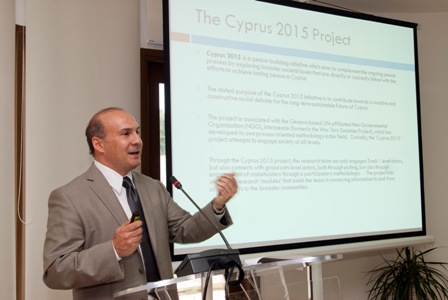Solving the Cyprus problem: Hopes and fears

The Interpeace initiative on the island, ‘Cyprus 2015’ has published the latest report, ‘Solving the Cyprus Problem: Hopes and Fears’. It captures the opinions and insights from Cypriots across the island, and their hopes versus their fears regarding the future.
The Interpeace initiative on the island, ‘Cyprus 2015’ has published the latest report, ‘Solving the Cyprus Problem: Hopes and Fears’. It captures the opinions and insights from Cypriots across the island, and their hopes versus their fears regarding the future.
Download the full report English | Greek | Turkish
While negotiations on finding a comprehensive settlement for the Cyprus problem continue between the two leaders there is a need to bridge the vertical gap between the leaderships and the society (both intra-communal and cross-communal) in order to enhance the long-term viability of a future settlement.
The initiative ‘Cyprus 2015’ was started in May 2009 to bridge these gaps and to complement the ongoing peace process by contributing towards a creative and constructive social debate for the long-term sustainable future of Cyprus around issues that are likely to develop over the next five years.
Spyros Christou. Photo Credit: cips-vidaluz for Interpeace
“It is hoped that the findings from our work at ‘Cyprus 2015’ will contribute towards incorporating a broader societal dimension into the high level negotiations, currently taking place between the leaders of the two communities.”
Spyros Christou, Greek Cypriot, Co-Director, of Interpeace initiative ‘Cyprus 2015’
Using a methodology described as participatory action research, the initiative brings together research and dialogue, to support socially desirable change.
This latest ‘Hopes and Fears’ report, accompanied by a film, is the culmination of two years of research and dialogue that has taken place across the island involving Greek Cypriots and Turkish Cypriots.
George Iacovou and Kudret Ozersay, representatives of the Greek Cypriot leader Demetris Christofias and the Turkish Cypriot leader Dervis Eroglu, at the public event on the 27th June 2011 co-organized by the Interpeace initiative on the island, 'Cyprus 2015' and 'ENGAGE - do your part for peace' where this latest report was presented.
Findings from public opinion polls, focus groups, individual interviews and stakeholder panels, both mono-and inter-communal have been integrated in this new report which covers the issues of governance and power sharing, economics, social dynamics, security and property.
Highlights of the findings in the report
• On governance - Both communities tend to be positive to the prospect that after so many years of division and enmity, an environment of partnership and cooperation would be created by a comprehensive Settlement. On the other hand, both communities express the fear that power sharing will prove very difficult in practice and serious challenges in implementing the agreement would arise.
• On property - Both communities express deep concerns about the current status quo; Greek Cypriots, because they do not have access to their properties in the North, and Turkish Cypriots, because the disputed nature of the properties they are currently using in combination with their lack of access to their original properties in the South makes them feel like they own nothing. While for these reasons both communities have motives for change in the property regime, they diverge in the actual solutions they propose.
• On security - The two communities are at odds regarding the future role of Turkey, with Turkish Cypriots strongly supporting and Greek Cypriots strongly opposing the continuation of Turkish guarantees. Having said that, neither community opposes a potential role for the European Union in ensuring the implementation of the agreement, and both support the notion that security threats should begin to be categorized so that the solution to each challenge can be found on its own merits.
• On the economy - Both communities express hope that a solution would, on the whole, increase levels of economic activity, investment and prosperity. At the same time, some economic fears are expressed though these differ in the two communities: Greek Cypriots fear that they will be asked to shoulder the financial burden of the solution’s implementation, while Turkish Cypriots fear that they would be dominated by an influx of Greek Cypriot capital.
"We are immensely encouraged by the fact that the UN Secretary General Ban Ki-moon makes reference to the island-wide public opinion polls that we, ‘Cyprus 2015’, conducted. We definitely feel the weight of this responsibility which made us double our efforts to contribute through our research to bringing the ongoing peace negotiations to an early comprehensive solution and our island to a sustainable future." Ahmet Sözen, Turkish Cypriot, Co-Director of Interpeace initiative ‘Cyprus 2015’.
